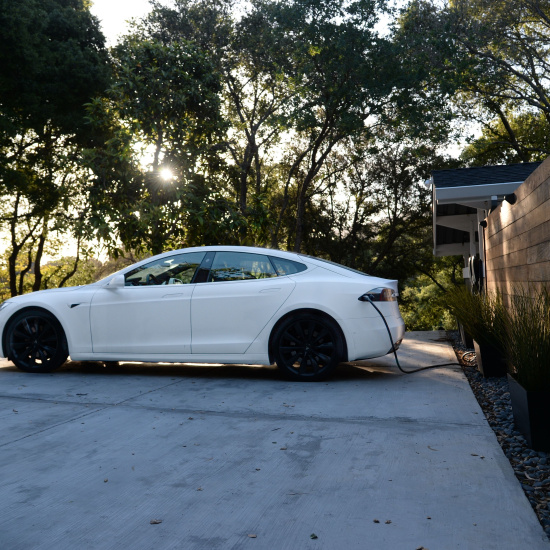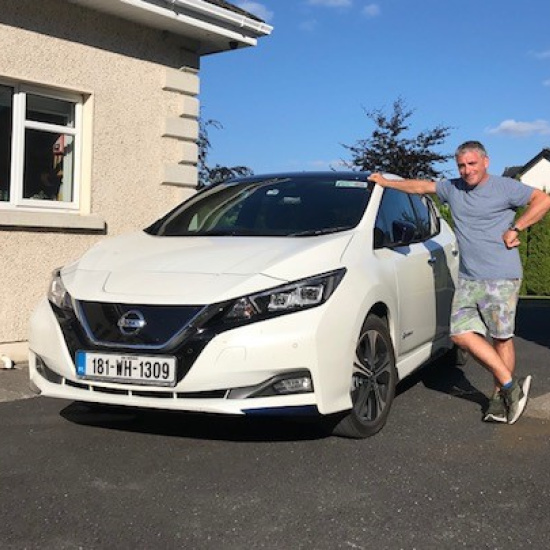Electric Vehicle Charging Essentials - Part 1
New to driving electric or planning to make the switch to an EV soon? We share all the essential information you need to know about charging your EV.
In this three-part series, we share everything you need to know about charging an electric vehicle. We often hear feedback and comments from people that charging can be a hurdle in the switch to electric. The how, when, where and the time it takes to charge an electric vehicle can be a bit intimidating! We will take you through the different ways you can charge an EV, the convenience of it and the support you will have on your EV journey.
Charging an Electric Vehicle (EV) - At Home
All EVs, except some very early models, now use the same cable and socket to charge at home. You can charge your EV using a professionally installed EV charger, or in exceptional circumstances, with a 3-pin plug. This will charge at a much lower speed.
Charging your EV at home is the cheapest and most convenient way to charge. With a wall mounted EV charger and a tethered charging lead, the process of plugging in can take seconds at the end of your day.
You will effectively be running your own electric filling station from the comfort of your home!
Installing a Home Charger
When it comes to purchasing an EV charger, there is a huge amount of choice out there. Charger design, user interface and features can vary significantly. SEAI maintain a list of chargers which meet specific criteria and include smart features. These features allow you to prioritise charging at lower electricity rates, give you information on kW and kWh (more on this later), adjust the charger to accommodate power usage within the rest of the house and ensure all charging is carried out safely.
On top of this, some chargers include the ability to charge a car from solar panels installed at your home, specifically when the panels are producing the right amount of excess power.
EV Charger Grants
SEAI offers a grant of €300 towards a home charger installation by a certified electrician. The home must have a private driveway to avail of this grant. The total cost for the charger and installation typically ranges from €1200 to €1600 before the grant is deducted. And the good news is, you can apply for the EV Charger grant before you even purchase your EV.
We recommend that you complete a pre-installation survey to help identify any potential issues with the suitability of your home's electricity connection to support an EV charger. Issues in this area are rare, however if you'd like to read more, we have a blog on meter tail upgrades which may be needed in older homes.
For apartments or other mixed development residents, it is the Management company or Landlord that must apply for the grant. SEAI provides a 60-90% grant towards those full installation costs based on a bulk installation of chargers at a single location. Owner Management Companies, Approved Housing Bodies, Local Authorities, Commercial and Private Landlords can apply.
In all cases, the SEAI grant must be approved before any work begins.
Cost of Home Charging
Electricity prices vary at different times of the day. Check with your electricity provider for the best rate, - you may find that charging your car at night is much cheaper than during the day. You can schedule when to charge your car through your wall mounted charger on your home or within your EV's interface and benefit from the lowest rate! When you combine an overnight low-cost Time of Use' (TOU) tariff, and generally efficient driving, the costs per 100km can come in at less than €1.50*. Our Fuel Price Comparison tool compares more typical usage costs across fuels.
(EV consumption assumed to be 14 - 15kWh/100km and an EV Time of Use Tariff of €0.09/kWh. High speed driving or adverse conditions may increase consumption to approximately 20kWh/100km.)
Some low-cost TOU tariff durations can be short at 2 to 4 hours. Therefore, charging a little each night may be more suitable than a few large charges each week. This has the added optional benefit of heating your car each morning from your home's electricity supply, avoiding the need to scrape ice off during the lower temperatures of the colder seasons!
Speed is of the Essence; The Tech
Home charger installations are typically capable of supplying 7kW of power; a kilowatt (kW) is the flow of energy, a kilowatt-hour (kWh) is the quantity of energy. This flow rate means that 7kWh are added to the car every hour. For example, a 70kWh battery could be fully charged in 10 hours. In more practical terms, 100km of range can be added to an EV in just two hours.
A short charging session each night could provide 700km of range for an EV each week. Less frequent sessions are likely sufficient for most EV owners, allowing for sharing of chargers in two-car homes or in apartment carparks.
When the time is right
Talk to an installer about arranging a survey and pick your favourite smart charger. Apply for your grant, and ensure you receive approval before commencing any works.
What's next
In the next blog in the EV Charging series, we'll discuss Neighbourhood and Destination charging, before finally reviewing En-Route Charging in the third blog.



